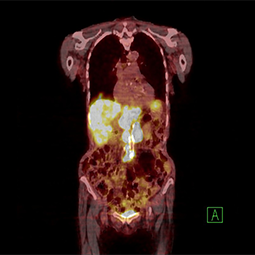Faster, easier PET/CT scan catches tumors
February 14, 2018

A new scan, called the GA68 Dotatate PET/CT scan, has arrived at Northwest Community Healthcare (NCH) and it’s replacing the Octreoscan, a test used for detecting tumors in patients with a history of neuroendocrine tumors.
Surgical oncologist Malcolm Bilimoria, M.D. is one of the doctors who eagerly awaited the new scan.
“I’m very happy to have the neuroendocrine PET/CT scan, also called a Dotatate PET/CT scan, at NCH,” Dr. Bilimoria says. “It allows for better clarity of the extent of disease and is used to make important treatment decisions.”
This PET/CT scan can be ordered by an oncologist or internal medicine physician and offers several benefits to patients, according to NCH Nuclear Medicine Facilitator Paul Rissmann, NMTCB. By using it, physicians are seeing a 71-80 percent change in clinical management, according to The National Center for Biotechnology Information (NCBI).
“We’re more able to pinpoint the location of the abnormalities,” Rissmann says.
The biggest advantages of the PET/CT scan are that it is more sensitive and specific than Octreoscan. It’s easier on the patient because it only requires two hours instead of two days. It also reduces radiation exposure to the patient.
How it works

A radioactive tracer is introduced into the body which causes the tumors to show up on the scan. Tumors in hard-to-see locations may not show up on a standard Octreoscan, but are seen more easily using this newer, more sensitive method.
“So far, I have had two patients in whom we found a tumor in the liver, despite a normal appearing CT scan,” Dr. Bilimoria says. “Patients with a history of neuroendocrine carcinoma should see us at the Illinois Center for Pancreatic and Hepatobiliary Diseases to see if this important scan could help them.”
Dr. Peter Cormier, Radiologist, has been reaching out to oncology groups to inform them about the new scan.
“We want to get the word out that we are excited to have this test as it’s going to help the patients and the clinicians,” Dr. Cormier says.
Think you might be a good candidate for this scan? Discuss it with an NCH physician who can order the procedure. Find out how PET/CT scans work and other types of imaging done at NCH.